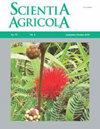Mega-environment analysis of maize breeding data from Brazil
IF 2.6
3区 农林科学
Q1 Agricultural and Biological Sciences
引用次数: 2
Abstract
ABSTRACT: The development and recommendation of single cross maize hybrids (SH) to be used in extensive land areas (mega-environments), and in different crop seasons requires many experiments under numerous environmental conditions. The question we asked is if the data from these multi-environment experiments are sufficient to identify the best hybrid combinations. The aim of this study was to critically analyze the phenotype data of experiments of yield, established by a large seed producing company, under a high level of imbalance. Data from evaluation of 2770 SH were used from experiments conducted over four years, involving the first and second crop seasons, in 50 locations of different years and regions of Brazil. Different types of analysis were carried out and genetic and non-genetic components were estimated, with emphasis on the different interactions of the SH with the environments. Results showed that the coincidence of common hybrids in these experiments is normally small. The estimates of the correlations between of the hybrids coinciding in the environments two by two is of low magnitude. The hybrid × crop season interaction was always expressive; however, the interactions of hybrids and other environmental variables were also important. Under these conditions, alternatives were discussed for making with the information obtained from the experiments, can be more efficient on the process to obtain new hybrids by companies.巴西玉米育种数据的大环境分析
摘要:单交玉米杂交种(SH)的开发和推荐需要在多种环境条件下进行大量的试验,才能在广阔的土地面积(大环境)和不同的作物季节中使用。我们的问题是,这些多环境实验的数据是否足以确定最佳的杂交组合。本研究的目的是批判性地分析由一家大型制种公司建立的在高水平不平衡下的产量实验的表型数据。对2770种SH进行评价的数据来自于在巴西不同年份和地区的50个地点进行的为期四年的试验,涉及第一和第二作物季节。进行了不同类型的分析,并估计了遗传和非遗传成分,重点是SH与环境的不同相互作用。结果表明,在这些实验中,普通杂交的巧合通常很小。在2 × 2的环境中重合的杂交种之间的相关性的估计是很低的。杂交种与作物季节的交互作用总是具有表达性的;然而,杂交种和其他环境变量的相互作用也很重要。在此条件下,讨论了利用实验获得的信息,使公司在获得新混合动力车的过程中更有效的替代方案。
本文章由计算机程序翻译,如有差异,请以英文原文为准。
求助全文
约1分钟内获得全文
求助全文
来源期刊

Scientia Agricola
农林科学-农业综合
CiteScore
5.10
自引率
3.80%
发文量
78
审稿时长
18-36 weeks
期刊介绍:
Scientia Agricola is a journal of the University of São Paulo edited at the Luiz de Queiroz campus in Piracicaba, a city in São Paulo state, southeastern Brazil. Scientia Agricola publishes original articles which contribute to the advancement of the agricultural, environmental and biological sciences.
 求助内容:
求助内容: 应助结果提醒方式:
应助结果提醒方式:


